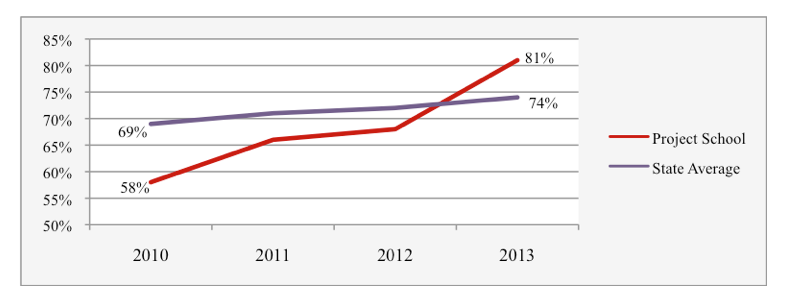Workshop Models Help Benefit LLI
The Project School Literacy Model is based on the systematic coordination of curriculum and instruction best practices that we have researched and selected to work together in order to ensure the success of all readers and writers.
At The Project School, the majority of the teaching of reading and writing occurs through the workshop model. Workshops are highly structured, predictable, purposeful, and well planned; they allow for students to take initiative, create work, and learn in a way that is meaningful.

Issues this Best Practice Addresses:
TPS Literacy Framework was developed using the very best thinking of the founders of TPS, standing on the shoulders of the most brilliant literacy minds in the nation. That said, there were students who we were not having the level of success that our school holds ourselves to and we knew that a change was needed.
In the spring of 2011, which was the middle of our second year in operation, our literacy data was showing that our lowest performing 25% of students were not excelling at the rate in which we had hoped. Due to this, the decision was made to begin an additional intervention structure that would allow for those reading below grade level to receive additional instruction. After much research, LLI was determined to be the intervention that would be purchased and implemented immediately.
Major Challenges to Implementation:
The major challenge to implementation of LLI is having the resources needed. While the LLI program itself is expensive, it is a one-time cost for the needed materials. This was accomplished through a consortium of funding sources. The longer-term challenge comes in the staffing needed for implementation. Creative use of staffing has allowed TPS to ensure that students who are in need of LLI can receive the service in a small group (typically 2-3 students) to reap the benefits of the intervention. This was achieved through Title I, special education, and other sources. An additional challenge has been in guaranteeing fidelity to the model. This has been achieved through coaching of the professional development and the actual implementation.
Benefits Derived from Implementing this Best Practice:
LLI (Leveled Literacy Intervention), has proven to show great strides with the majority of students participating in this program. We believe this to another reason that 97% of our 3rd graders passed IREAD-3 in 2013. We currently use LLI with students K-8 at their instructional level.
Evidence Illustrating Success:
In looking at change over time for IREAD scores, TPS has had a very positive trend, increasing the passing percentage and outperforming the state average.

Over the past four years The Bloomington Project School has made great strides on ISTEP+. During that time, The Project School has increased their passage rate by an astonishing 24% – improving each year – and placing the school in top 3% of all schools in improvement over the past four years. All of this improvement has culminated in 81% of Project School students passing both the ELA and Math ISTEP+ in 2013, well above the state average (74%).

TPS has a strong history of performance and improvement on the ISTEP+ and is one of less than 2% of Hoosier schools that can say they have improved on both the ELA and Math portions of the ISTEP+ each of the past four years. When this improvement is coupled with the school’s strong performance in 2013, there is little doubt that TPS is quickly ascending the list of highest performing (and quality) schools in the state.
Submitted by: Catherine Diersing and Heather Baron Caudill, The Project School
